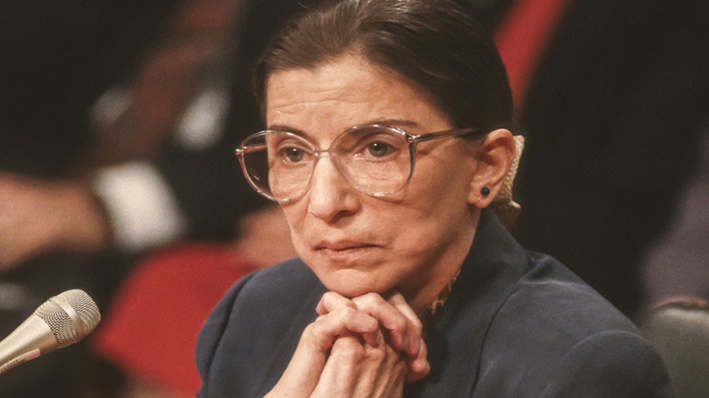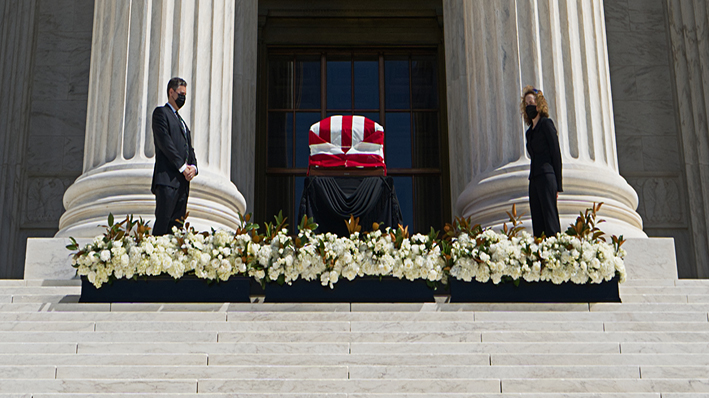
RobCrandall/Shutterstock.com
“In my growing up years, men of the bench and bar generally held what the French call an idee fixe the unyielding conviction that women and lawyering, no less judging, do not mix‚” Justice Ruth Bader Ginsburg.
This notion of male domination of the legal profession is actively challenged by women surrounding me today. Still, as I read these words before closing Ginsburg’s book, My Own Words, I couldn’t help but contemplate the loss of one individual female Justice. I couldn’t help but consider the inevitable loss of a U.S. Supreme Court Justice who remains a feminist trailblazer to this day. This was the night before Ginsburg had passed.
Evidently enough, diverse reactions on behalf of American citizens also reflected the prior realizations of the inevitable termination of her time as Justice.
Ruth Bader Ginsburg (1933-2020)
Her passing was greeted with feelings of disappointment, anger, resentment, and for others, of the opposite persuasion, relief or satisfaction! RBG posthumously remains the notorious trailblazer of many “firsts” in the U.S. She said: “I am optimistic, however, that movement toward enlistment of the talent of all who compose ‘We the People’ will continue.”
Whether you might take this quote to prove Ginsburg partiality, something which we are all victims of ourselves, or to create a fathomable image of RBG as a lifelong advocate for women’s rights and gender equality, it is important to understand her legal contributions which have allowed for the interpretation of the Constitution in a manner which made possible the equal protection of both women and men under the same law.
ADVOCACY
Throughout her advocacy efforts, Ginsburg helped lead efforts through the ACLU Women’s Rights Project which directly led to the recognition of pregnancy discrimination in the workplace as a form of sex discrimination. This indirectly led to the implementation of the Pregnancy Discrimination Act and protection against dismissal from work simply on the basis of women being pregnant.
Her contributions as Justice have furthered specific legal undertakings which have set in place a long list of rights exercised by women and men today. While lecturing as a professor on sex discrimination and law, she also worked on briefs for the ACLU which applied the Fifth and Fourteenth amendments, each of their respective equal protection clauses.
Her application of the Equal Protection Clause to sex discrimination under tax laws eventually allowed for the 1971 decision which abrogated a provision of an International Revenue Code pertaining to pension benefit. Whereas it may have been assumed that only men and families support, the financial benefits of single women and married women alike have changed to equal those of men.

EscapadeLeo/Shutterstock.com
This application of the Constitution’s provisions to national legislation gave rise to economic independence of women. In other words, RBG’s efforts can be directly associated with consequences such as women’s ability to sign a mortgage without male cosigner, open a checking account without male cosigner, attain a credit card without male cosigner, or start a business or obtain business loan without a male cosigner.
DECISIONS, DECISIONS
In 1996, Ginsburg authored the Court’s majority opinion in United States v. Virginia. This decision argued for equal protection provided to applicants of both sexes in state funded schools. She authorized the dissenting opinion of the Court’s decision in Ledbetter v. Goodyear Tire and Rubber Co., arguing that pay discrimination mustn’t be applied to female or male employees at any point in time, her dissenting opinion was eventually accepted as majority when the Equal Pay Act of 2009 was signed into law.
This year, the Court exercised jurisdiction over Bostock v. Clayton County, a court case which legally applied Title VII of the Civil Rights Act to outlaw gender discrimination in employment. This recent decision highlights the fact that realities faced by women and men remain substantively different in various domains.
RBG’s work does not have to end with RBG. Her work can continue, and future court decisions can be made by others, including women. Ginsburg argued that women’s civic duty should also be regarded as equal to that of men. This is why she pushed this argument forward as Justice to require female participation on juries, and it’s why she was a trailblazer; the first tenured female law professor at Columbia University’s Law School; and eventually, the first Jewish woman and the second woman to serve in the U.S. Supreme Court.
Whether you were disappointed with Ginsburg failure to give up her seat on the bench years before, whether you have been contemplated the grim prospects of a Supreme Court without her, or whether you were relieved for the potential of her replacement before January of next year, consider RBG’s contributions to strengthening equality between women and men, and how recent these strides really are.
SOURCES
https://www.aclu.org/other/tribute-legacy-ruth-bader-ginsburg-and-wrp-staff#pioneer
https://www.loc.gov/exhibitions/drawing-justice-courtroom-illustrations/about-this-exhibition/race-based-crimes/women-serving-on-juries/
About the Article
A tribute to the late Ruth Bader Ginsburg, Justice U.S. Supreme Court.



